Foundation Phase: Life Skills Teaching and Social-Emotional Well-being
VerifiedAdded on 2023/06/04
|10
|2984
|442
Report
AI Summary
This report delves into the critical aspects of life skills teaching in the foundation phase, emphasizing personal and social well-being. It explores the significance of social-emotional development in children, effective classroom strategies to promote a sense of belonging, and an understanding of interpersonal interactions. The report also examines the culture of wellness in the classroom, teacher interview insights, and effective resources for diverse learners, including the integration of multiple intelligences. Furthermore, it identifies learning barriers and support mechanisms, addresses challenges posed by diversification in South Africa, and underscores the importance of promoting personal and social skills to enhance children's overall development. Desklib provides students with access to this assignment solution and many other resources to aid in their academic journey.
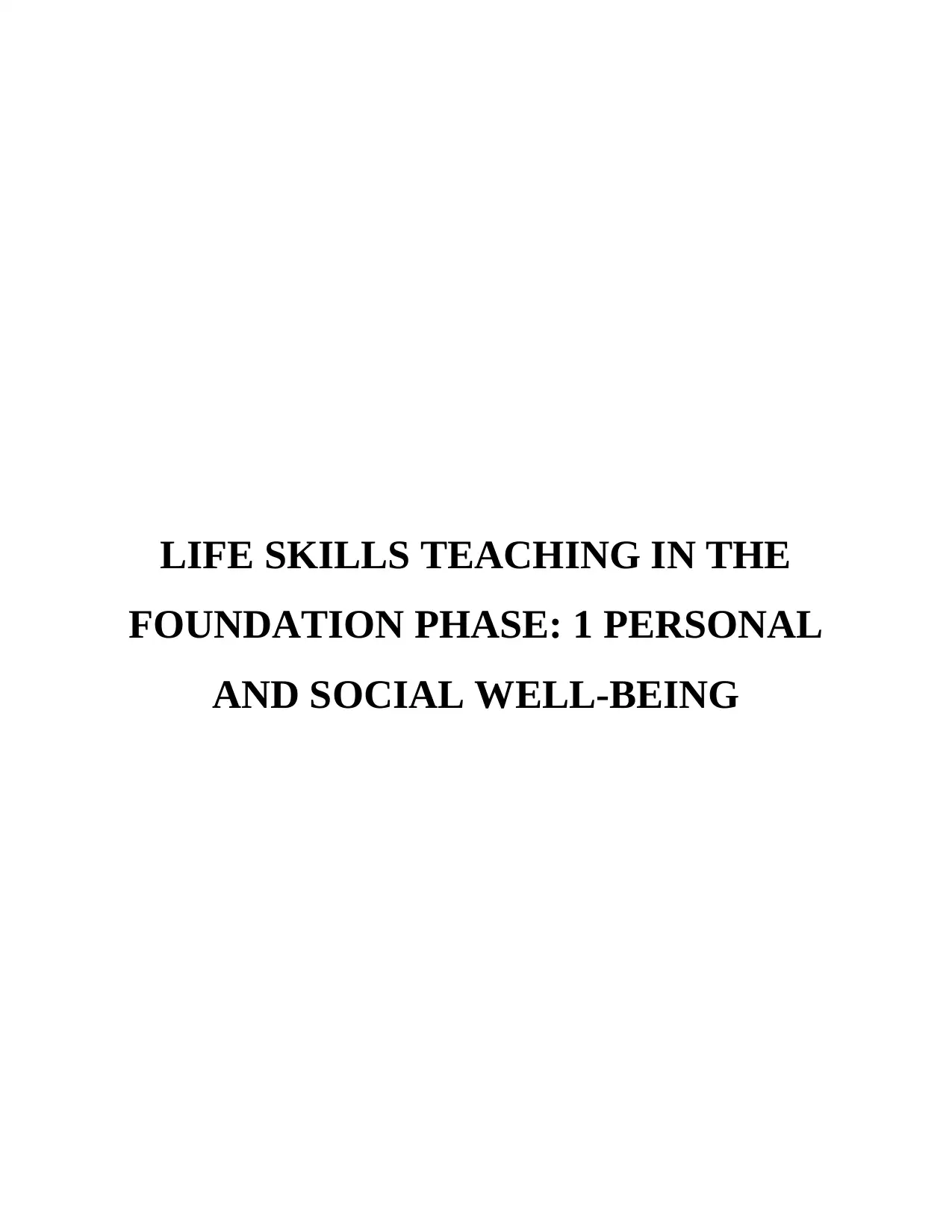
LIFE SKILLS TEACHING IN THE
FOUNDATION PHASE: 1 PERSONAL
AND SOCIAL WELL-BEING
FOUNDATION PHASE: 1 PERSONAL
AND SOCIAL WELL-BEING
Secure Best Marks with AI Grader
Need help grading? Try our AI Grader for instant feedback on your assignments.
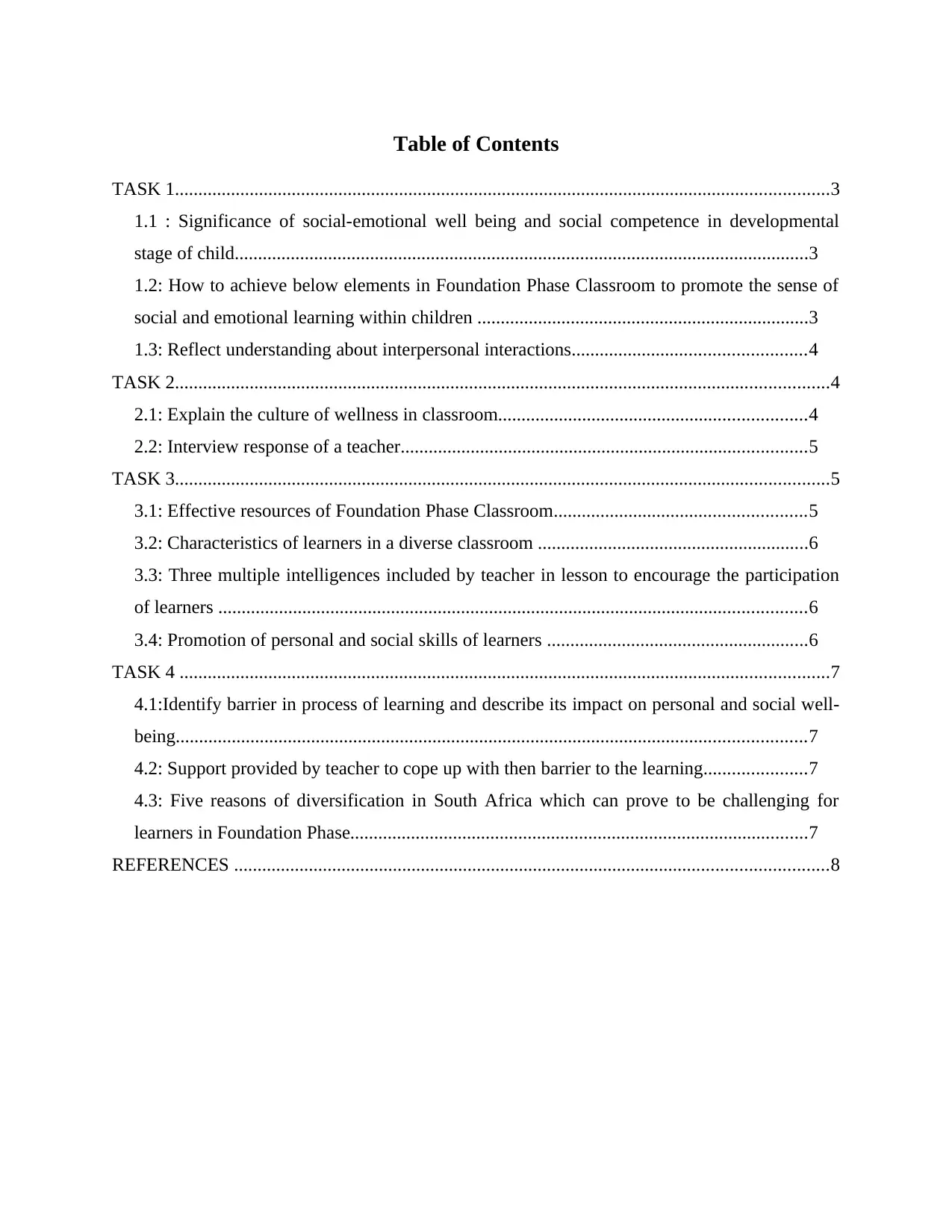
Table of Contents
TASK 1............................................................................................................................................3
1.1 : Significance of social-emotional well being and social competence in developmental
stage of child...........................................................................................................................3
1.2: How to achieve below elements in Foundation Phase Classroom to promote the sense of
social and emotional learning within children .......................................................................3
1.3: Reflect understanding about interpersonal interactions..................................................4
TASK 2............................................................................................................................................4
2.1: Explain the culture of wellness in classroom..................................................................4
2.2: Interview response of a teacher.......................................................................................5
TASK 3............................................................................................................................................5
3.1: Effective resources of Foundation Phase Classroom......................................................5
3.2: Characteristics of learners in a diverse classroom ..........................................................6
3.3: Three multiple intelligences included by teacher in lesson to encourage the participation
of learners ..............................................................................................................................6
3.4: Promotion of personal and social skills of learners ........................................................6
TASK 4 ...........................................................................................................................................7
4.1:Identify barrier in process of learning and describe its impact on personal and social well-
being.......................................................................................................................................7
4.2: Support provided by teacher to cope up with then barrier to the learning......................7
4.3: Five reasons of diversification in South Africa which can prove to be challenging for
learners in Foundation Phase..................................................................................................7
REFERENCES ...............................................................................................................................8
TASK 1............................................................................................................................................3
1.1 : Significance of social-emotional well being and social competence in developmental
stage of child...........................................................................................................................3
1.2: How to achieve below elements in Foundation Phase Classroom to promote the sense of
social and emotional learning within children .......................................................................3
1.3: Reflect understanding about interpersonal interactions..................................................4
TASK 2............................................................................................................................................4
2.1: Explain the culture of wellness in classroom..................................................................4
2.2: Interview response of a teacher.......................................................................................5
TASK 3............................................................................................................................................5
3.1: Effective resources of Foundation Phase Classroom......................................................5
3.2: Characteristics of learners in a diverse classroom ..........................................................6
3.3: Three multiple intelligences included by teacher in lesson to encourage the participation
of learners ..............................................................................................................................6
3.4: Promotion of personal and social skills of learners ........................................................6
TASK 4 ...........................................................................................................................................7
4.1:Identify barrier in process of learning and describe its impact on personal and social well-
being.......................................................................................................................................7
4.2: Support provided by teacher to cope up with then barrier to the learning......................7
4.3: Five reasons of diversification in South Africa which can prove to be challenging for
learners in Foundation Phase..................................................................................................7
REFERENCES ...............................................................................................................................8
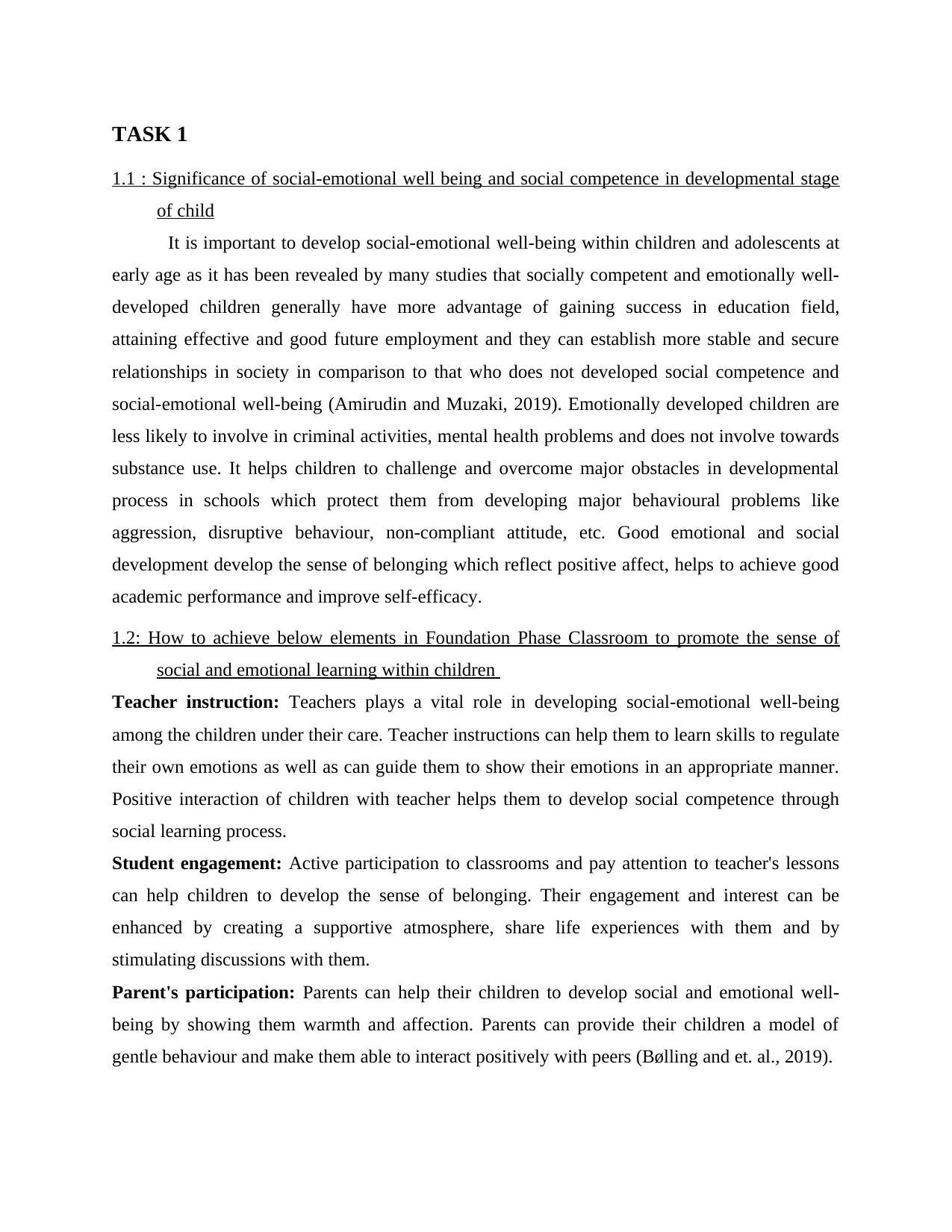
TASK 1
1.1 : Significance of social-emotional well being and social competence in developmental stage
of child
It is important to develop social-emotional well-being within children and adolescents at
early age as it has been revealed by many studies that socially competent and emotionally well-
developed children generally have more advantage of gaining success in education field,
attaining effective and good future employment and they can establish more stable and secure
relationships in society in comparison to that who does not developed social competence and
social-emotional well-being (Amirudin and Muzaki, 2019). Emotionally developed children are
less likely to involve in criminal activities, mental health problems and does not involve towards
substance use. It helps children to challenge and overcome major obstacles in developmental
process in schools which protect them from developing major behavioural problems like
aggression, disruptive behaviour, non-compliant attitude, etc. Good emotional and social
development develop the sense of belonging which reflect positive affect, helps to achieve good
academic performance and improve self-efficacy.
1.2: How to achieve below elements in Foundation Phase Classroom to promote the sense of
social and emotional learning within children
Teacher instruction: Teachers plays a vital role in developing social-emotional well-being
among the children under their care. Teacher instructions can help them to learn skills to regulate
their own emotions as well as can guide them to show their emotions in an appropriate manner.
Positive interaction of children with teacher helps them to develop social competence through
social learning process.
Student engagement: Active participation to classrooms and pay attention to teacher's lessons
can help children to develop the sense of belonging. Their engagement and interest can be
enhanced by creating a supportive atmosphere, share life experiences with them and by
stimulating discussions with them.
Parent's participation: Parents can help their children to develop social and emotional well-
being by showing them warmth and affection. Parents can provide their children a model of
gentle behaviour and make them able to interact positively with peers (Bølling and et. al., 2019).
1.1 : Significance of social-emotional well being and social competence in developmental stage
of child
It is important to develop social-emotional well-being within children and adolescents at
early age as it has been revealed by many studies that socially competent and emotionally well-
developed children generally have more advantage of gaining success in education field,
attaining effective and good future employment and they can establish more stable and secure
relationships in society in comparison to that who does not developed social competence and
social-emotional well-being (Amirudin and Muzaki, 2019). Emotionally developed children are
less likely to involve in criminal activities, mental health problems and does not involve towards
substance use. It helps children to challenge and overcome major obstacles in developmental
process in schools which protect them from developing major behavioural problems like
aggression, disruptive behaviour, non-compliant attitude, etc. Good emotional and social
development develop the sense of belonging which reflect positive affect, helps to achieve good
academic performance and improve self-efficacy.
1.2: How to achieve below elements in Foundation Phase Classroom to promote the sense of
social and emotional learning within children
Teacher instruction: Teachers plays a vital role in developing social-emotional well-being
among the children under their care. Teacher instructions can help them to learn skills to regulate
their own emotions as well as can guide them to show their emotions in an appropriate manner.
Positive interaction of children with teacher helps them to develop social competence through
social learning process.
Student engagement: Active participation to classrooms and pay attention to teacher's lessons
can help children to develop the sense of belonging. Their engagement and interest can be
enhanced by creating a supportive atmosphere, share life experiences with them and by
stimulating discussions with them.
Parent's participation: Parents can help their children to develop social and emotional well-
being by showing them warmth and affection. Parents can provide their children a model of
gentle behaviour and make them able to interact positively with peers (Bølling and et. al., 2019).
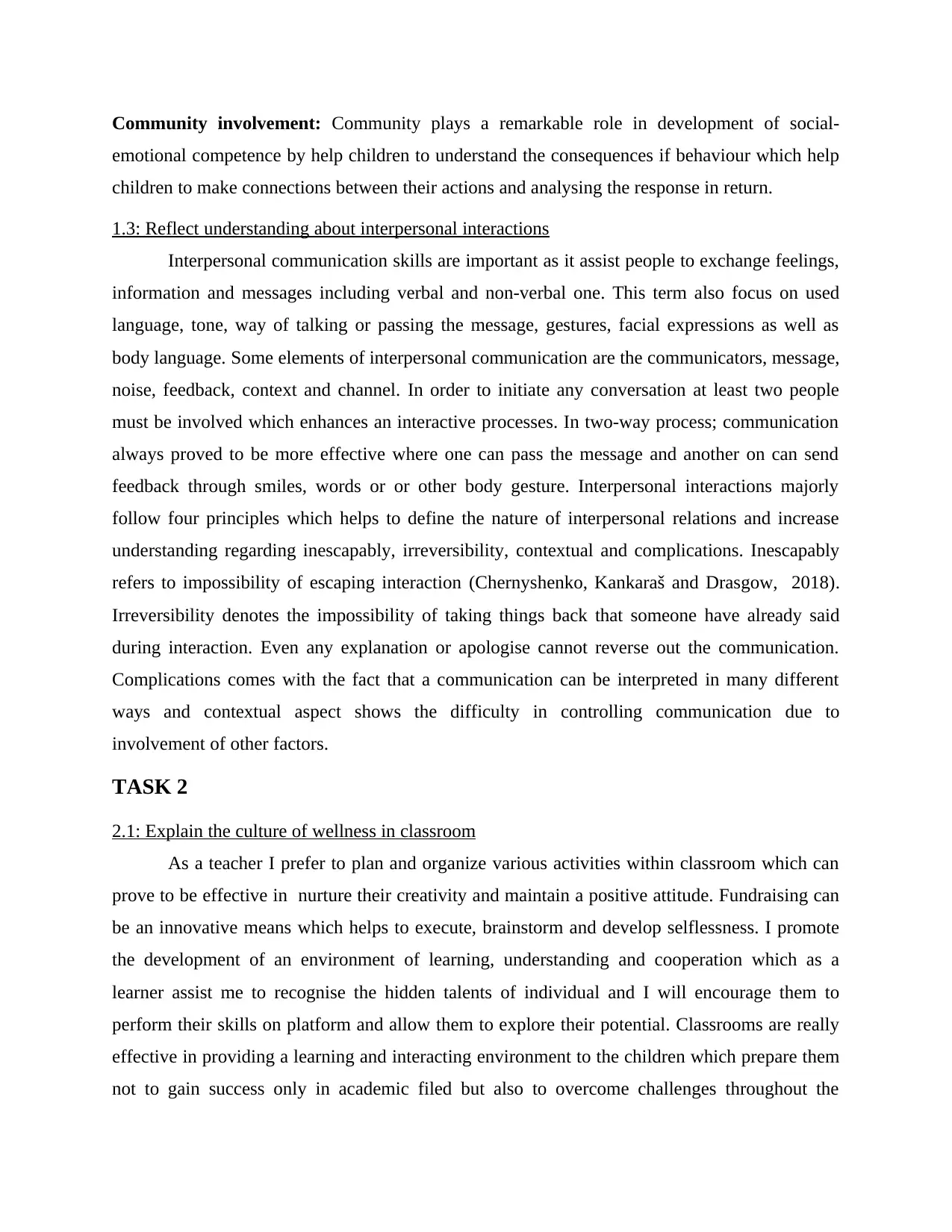
Community involvement: Community plays a remarkable role in development of social-
emotional competence by help children to understand the consequences if behaviour which help
children to make connections between their actions and analysing the response in return.
1.3: Reflect understanding about interpersonal interactions
Interpersonal communication skills are important as it assist people to exchange feelings,
information and messages including verbal and non-verbal one. This term also focus on used
language, tone, way of talking or passing the message, gestures, facial expressions as well as
body language. Some elements of interpersonal communication are the communicators, message,
noise, feedback, context and channel. In order to initiate any conversation at least two people
must be involved which enhances an interactive processes. In two-way process; communication
always proved to be more effective where one can pass the message and another on can send
feedback through smiles, words or or other body gesture. Interpersonal interactions majorly
follow four principles which helps to define the nature of interpersonal relations and increase
understanding regarding inescapably, irreversibility, contextual and complications. Inescapably
refers to impossibility of escaping interaction (Chernyshenko, Kankaraš and Drasgow, 2018).
Irreversibility denotes the impossibility of taking things back that someone have already said
during interaction. Even any explanation or apologise cannot reverse out the communication.
Complications comes with the fact that a communication can be interpreted in many different
ways and contextual aspect shows the difficulty in controlling communication due to
involvement of other factors.
TASK 2
2.1: Explain the culture of wellness in classroom
As a teacher I prefer to plan and organize various activities within classroom which can
prove to be effective in nurture their creativity and maintain a positive attitude. Fundraising can
be an innovative means which helps to execute, brainstorm and develop selflessness. I promote
the development of an environment of learning, understanding and cooperation which as a
learner assist me to recognise the hidden talents of individual and I will encourage them to
perform their skills on platform and allow them to explore their potential. Classrooms are really
effective in providing a learning and interacting environment to the children which prepare them
not to gain success only in academic filed but also to overcome challenges throughout the
emotional competence by help children to understand the consequences if behaviour which help
children to make connections between their actions and analysing the response in return.
1.3: Reflect understanding about interpersonal interactions
Interpersonal communication skills are important as it assist people to exchange feelings,
information and messages including verbal and non-verbal one. This term also focus on used
language, tone, way of talking or passing the message, gestures, facial expressions as well as
body language. Some elements of interpersonal communication are the communicators, message,
noise, feedback, context and channel. In order to initiate any conversation at least two people
must be involved which enhances an interactive processes. In two-way process; communication
always proved to be more effective where one can pass the message and another on can send
feedback through smiles, words or or other body gesture. Interpersonal interactions majorly
follow four principles which helps to define the nature of interpersonal relations and increase
understanding regarding inescapably, irreversibility, contextual and complications. Inescapably
refers to impossibility of escaping interaction (Chernyshenko, Kankaraš and Drasgow, 2018).
Irreversibility denotes the impossibility of taking things back that someone have already said
during interaction. Even any explanation or apologise cannot reverse out the communication.
Complications comes with the fact that a communication can be interpreted in many different
ways and contextual aspect shows the difficulty in controlling communication due to
involvement of other factors.
TASK 2
2.1: Explain the culture of wellness in classroom
As a teacher I prefer to plan and organize various activities within classroom which can
prove to be effective in nurture their creativity and maintain a positive attitude. Fundraising can
be an innovative means which helps to execute, brainstorm and develop selflessness. I promote
the development of an environment of learning, understanding and cooperation which as a
learner assist me to recognise the hidden talents of individual and I will encourage them to
perform their skills on platform and allow them to explore their potential. Classrooms are really
effective in providing a learning and interacting environment to the children which prepare them
not to gain success only in academic filed but also to overcome challenges throughout the
Secure Best Marks with AI Grader
Need help grading? Try our AI Grader for instant feedback on your assignments.
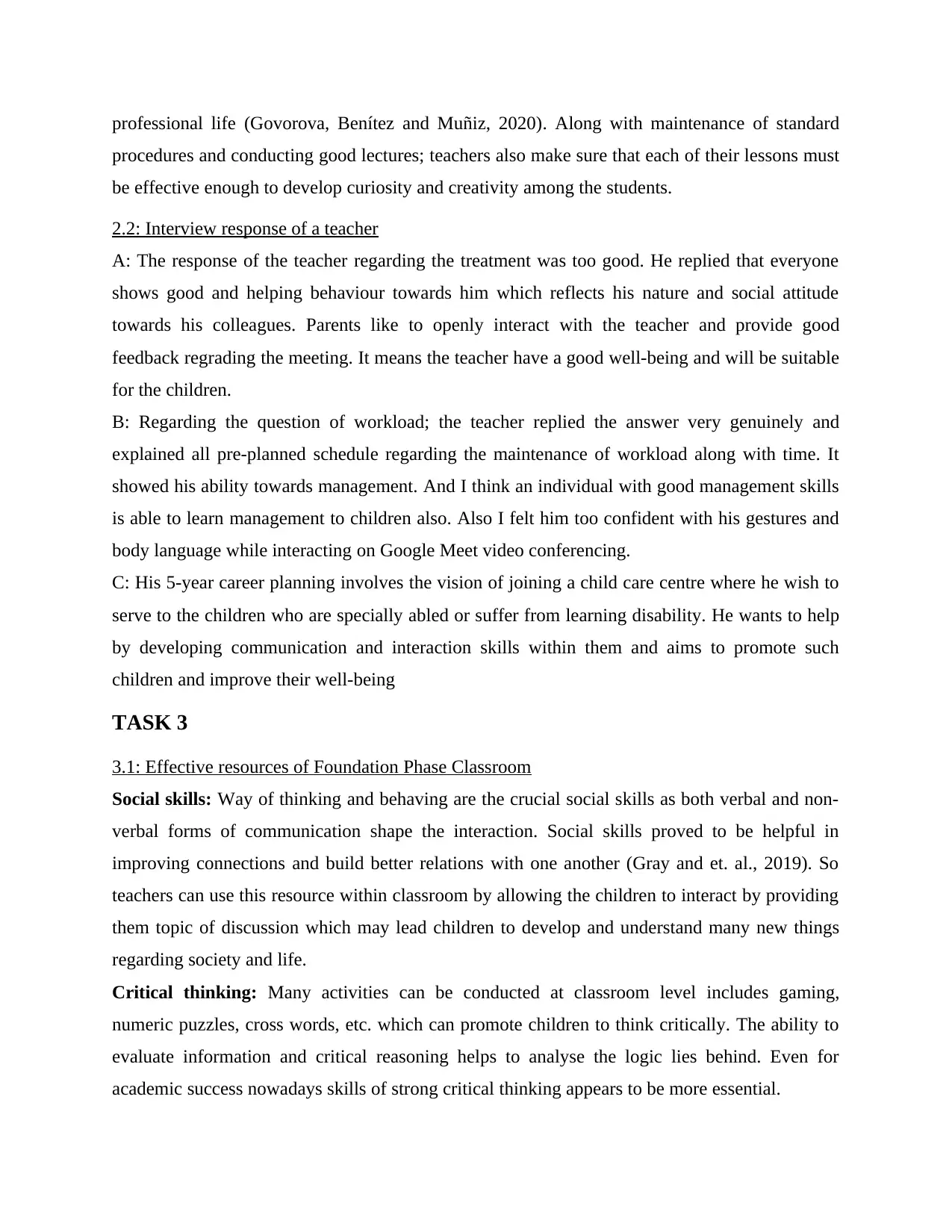
professional life (Govorova, Benítez and Muñiz, 2020). Along with maintenance of standard
procedures and conducting good lectures; teachers also make sure that each of their lessons must
be effective enough to develop curiosity and creativity among the students.
2.2: Interview response of a teacher
A: The response of the teacher regarding the treatment was too good. He replied that everyone
shows good and helping behaviour towards him which reflects his nature and social attitude
towards his colleagues. Parents like to openly interact with the teacher and provide good
feedback regrading the meeting. It means the teacher have a good well-being and will be suitable
for the children.
B: Regarding the question of workload; the teacher replied the answer very genuinely and
explained all pre-planned schedule regarding the maintenance of workload along with time. It
showed his ability towards management. And I think an individual with good management skills
is able to learn management to children also. Also I felt him too confident with his gestures and
body language while interacting on Google Meet video conferencing.
C: His 5-year career planning involves the vision of joining a child care centre where he wish to
serve to the children who are specially abled or suffer from learning disability. He wants to help
by developing communication and interaction skills within them and aims to promote such
children and improve their well-being
TASK 3
3.1: Effective resources of Foundation Phase Classroom
Social skills: Way of thinking and behaving are the crucial social skills as both verbal and non-
verbal forms of communication shape the interaction. Social skills proved to be helpful in
improving connections and build better relations with one another (Gray and et. al., 2019). So
teachers can use this resource within classroom by allowing the children to interact by providing
them topic of discussion which may lead children to develop and understand many new things
regarding society and life.
Critical thinking: Many activities can be conducted at classroom level includes gaming,
numeric puzzles, cross words, etc. which can promote children to think critically. The ability to
evaluate information and critical reasoning helps to analyse the logic lies behind. Even for
academic success nowadays skills of strong critical thinking appears to be more essential.
procedures and conducting good lectures; teachers also make sure that each of their lessons must
be effective enough to develop curiosity and creativity among the students.
2.2: Interview response of a teacher
A: The response of the teacher regarding the treatment was too good. He replied that everyone
shows good and helping behaviour towards him which reflects his nature and social attitude
towards his colleagues. Parents like to openly interact with the teacher and provide good
feedback regrading the meeting. It means the teacher have a good well-being and will be suitable
for the children.
B: Regarding the question of workload; the teacher replied the answer very genuinely and
explained all pre-planned schedule regarding the maintenance of workload along with time. It
showed his ability towards management. And I think an individual with good management skills
is able to learn management to children also. Also I felt him too confident with his gestures and
body language while interacting on Google Meet video conferencing.
C: His 5-year career planning involves the vision of joining a child care centre where he wish to
serve to the children who are specially abled or suffer from learning disability. He wants to help
by developing communication and interaction skills within them and aims to promote such
children and improve their well-being
TASK 3
3.1: Effective resources of Foundation Phase Classroom
Social skills: Way of thinking and behaving are the crucial social skills as both verbal and non-
verbal forms of communication shape the interaction. Social skills proved to be helpful in
improving connections and build better relations with one another (Gray and et. al., 2019). So
teachers can use this resource within classroom by allowing the children to interact by providing
them topic of discussion which may lead children to develop and understand many new things
regarding society and life.
Critical thinking: Many activities can be conducted at classroom level includes gaming,
numeric puzzles, cross words, etc. which can promote children to think critically. The ability to
evaluate information and critical reasoning helps to analyse the logic lies behind. Even for
academic success nowadays skills of strong critical thinking appears to be more essential.
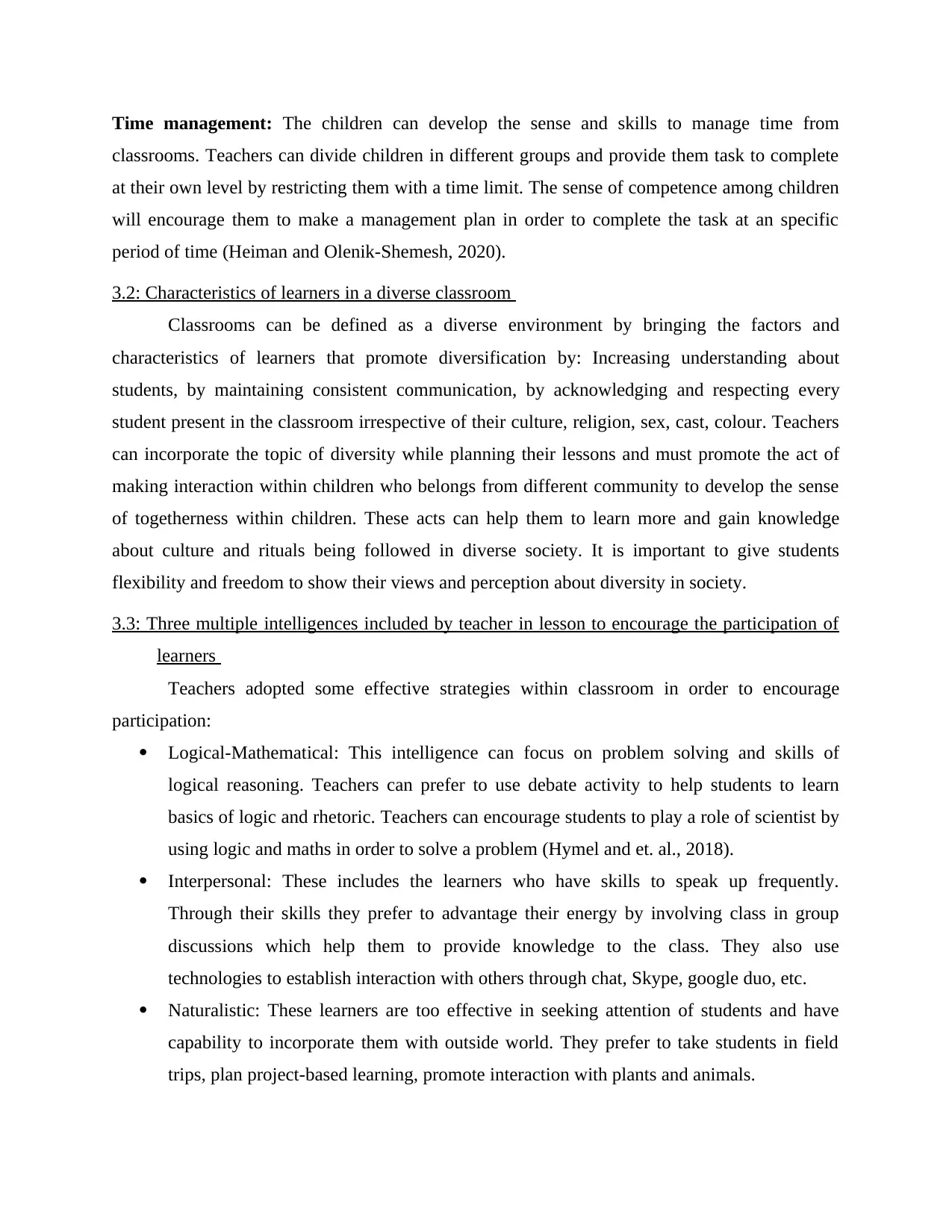
Time management: The children can develop the sense and skills to manage time from
classrooms. Teachers can divide children in different groups and provide them task to complete
at their own level by restricting them with a time limit. The sense of competence among children
will encourage them to make a management plan in order to complete the task at an specific
period of time (Heiman and Olenik-Shemesh, 2020).
3.2: Characteristics of learners in a diverse classroom
Classrooms can be defined as a diverse environment by bringing the factors and
characteristics of learners that promote diversification by: Increasing understanding about
students, by maintaining consistent communication, by acknowledging and respecting every
student present in the classroom irrespective of their culture, religion, sex, cast, colour. Teachers
can incorporate the topic of diversity while planning their lessons and must promote the act of
making interaction within children who belongs from different community to develop the sense
of togetherness within children. These acts can help them to learn more and gain knowledge
about culture and rituals being followed in diverse society. It is important to give students
flexibility and freedom to show their views and perception about diversity in society.
3.3: Three multiple intelligences included by teacher in lesson to encourage the participation of
learners
Teachers adopted some effective strategies within classroom in order to encourage
participation:
Logical-Mathematical: This intelligence can focus on problem solving and skills of
logical reasoning. Teachers can prefer to use debate activity to help students to learn
basics of logic and rhetoric. Teachers can encourage students to play a role of scientist by
using logic and maths in order to solve a problem (Hymel and et. al., 2018).
Interpersonal: These includes the learners who have skills to speak up frequently.
Through their skills they prefer to advantage their energy by involving class in group
discussions which help them to provide knowledge to the class. They also use
technologies to establish interaction with others through chat, Skype, google duo, etc.
Naturalistic: These learners are too effective in seeking attention of students and have
capability to incorporate them with outside world. They prefer to take students in field
trips, plan project-based learning, promote interaction with plants and animals.
classrooms. Teachers can divide children in different groups and provide them task to complete
at their own level by restricting them with a time limit. The sense of competence among children
will encourage them to make a management plan in order to complete the task at an specific
period of time (Heiman and Olenik-Shemesh, 2020).
3.2: Characteristics of learners in a diverse classroom
Classrooms can be defined as a diverse environment by bringing the factors and
characteristics of learners that promote diversification by: Increasing understanding about
students, by maintaining consistent communication, by acknowledging and respecting every
student present in the classroom irrespective of their culture, religion, sex, cast, colour. Teachers
can incorporate the topic of diversity while planning their lessons and must promote the act of
making interaction within children who belongs from different community to develop the sense
of togetherness within children. These acts can help them to learn more and gain knowledge
about culture and rituals being followed in diverse society. It is important to give students
flexibility and freedom to show their views and perception about diversity in society.
3.3: Three multiple intelligences included by teacher in lesson to encourage the participation of
learners
Teachers adopted some effective strategies within classroom in order to encourage
participation:
Logical-Mathematical: This intelligence can focus on problem solving and skills of
logical reasoning. Teachers can prefer to use debate activity to help students to learn
basics of logic and rhetoric. Teachers can encourage students to play a role of scientist by
using logic and maths in order to solve a problem (Hymel and et. al., 2018).
Interpersonal: These includes the learners who have skills to speak up frequently.
Through their skills they prefer to advantage their energy by involving class in group
discussions which help them to provide knowledge to the class. They also use
technologies to establish interaction with others through chat, Skype, google duo, etc.
Naturalistic: These learners are too effective in seeking attention of students and have
capability to incorporate them with outside world. They prefer to take students in field
trips, plan project-based learning, promote interaction with plants and animals.
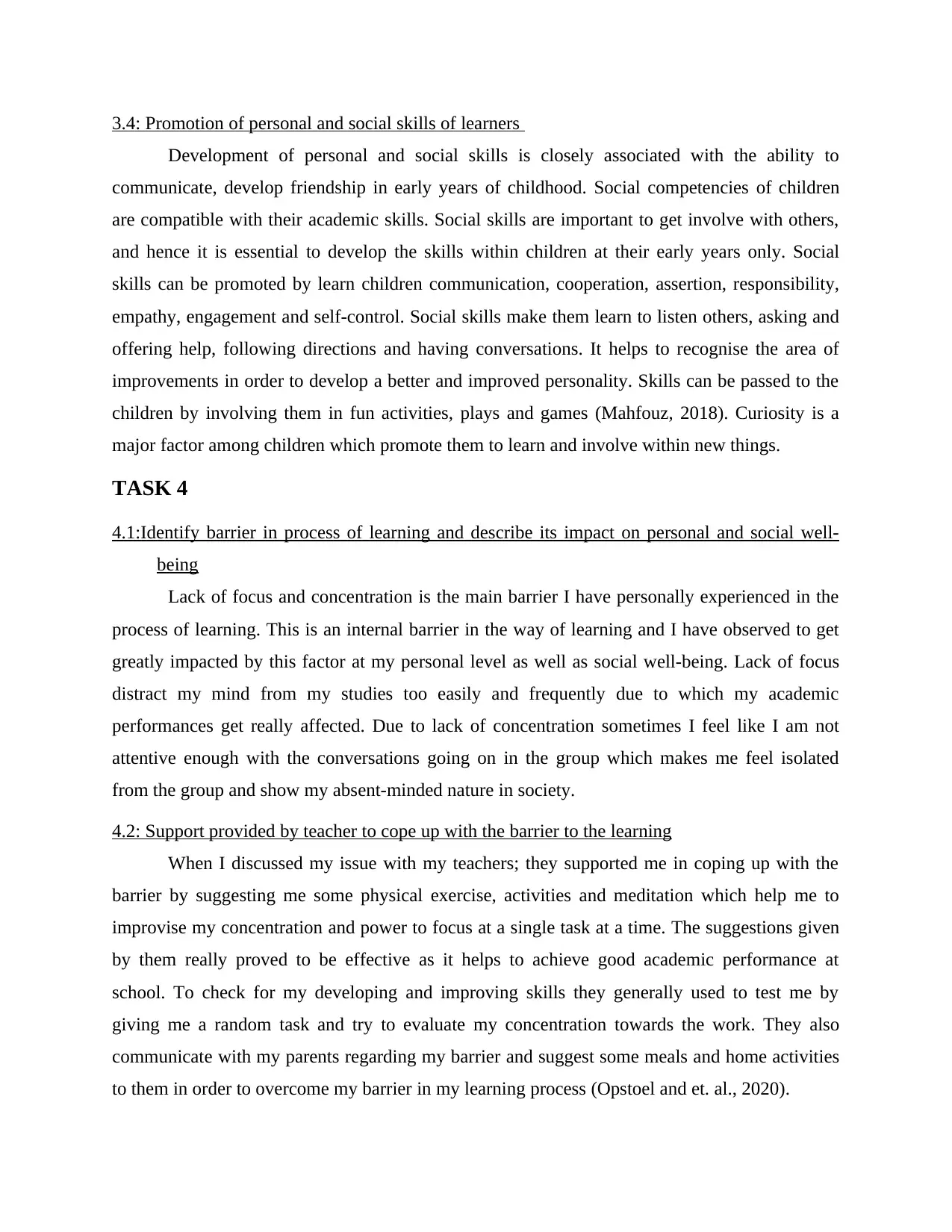
3.4: Promotion of personal and social skills of learners
Development of personal and social skills is closely associated with the ability to
communicate, develop friendship in early years of childhood. Social competencies of children
are compatible with their academic skills. Social skills are important to get involve with others,
and hence it is essential to develop the skills within children at their early years only. Social
skills can be promoted by learn children communication, cooperation, assertion, responsibility,
empathy, engagement and self-control. Social skills make them learn to listen others, asking and
offering help, following directions and having conversations. It helps to recognise the area of
improvements in order to develop a better and improved personality. Skills can be passed to the
children by involving them in fun activities, plays and games (Mahfouz, 2018). Curiosity is a
major factor among children which promote them to learn and involve within new things.
TASK 4
4.1:Identify barrier in process of learning and describe its impact on personal and social well-
being
Lack of focus and concentration is the main barrier I have personally experienced in the
process of learning. This is an internal barrier in the way of learning and I have observed to get
greatly impacted by this factor at my personal level as well as social well-being. Lack of focus
distract my mind from my studies too easily and frequently due to which my academic
performances get really affected. Due to lack of concentration sometimes I feel like I am not
attentive enough with the conversations going on in the group which makes me feel isolated
from the group and show my absent-minded nature in society.
4.2: Support provided by teacher to cope up with the barrier to the learning
When I discussed my issue with my teachers; they supported me in coping up with the
barrier by suggesting me some physical exercise, activities and meditation which help me to
improvise my concentration and power to focus at a single task at a time. The suggestions given
by them really proved to be effective as it helps to achieve good academic performance at
school. To check for my developing and improving skills they generally used to test me by
giving me a random task and try to evaluate my concentration towards the work. They also
communicate with my parents regarding my barrier and suggest some meals and home activities
to them in order to overcome my barrier in my learning process (Opstoel and et. al., 2020).
Development of personal and social skills is closely associated with the ability to
communicate, develop friendship in early years of childhood. Social competencies of children
are compatible with their academic skills. Social skills are important to get involve with others,
and hence it is essential to develop the skills within children at their early years only. Social
skills can be promoted by learn children communication, cooperation, assertion, responsibility,
empathy, engagement and self-control. Social skills make them learn to listen others, asking and
offering help, following directions and having conversations. It helps to recognise the area of
improvements in order to develop a better and improved personality. Skills can be passed to the
children by involving them in fun activities, plays and games (Mahfouz, 2018). Curiosity is a
major factor among children which promote them to learn and involve within new things.
TASK 4
4.1:Identify barrier in process of learning and describe its impact on personal and social well-
being
Lack of focus and concentration is the main barrier I have personally experienced in the
process of learning. This is an internal barrier in the way of learning and I have observed to get
greatly impacted by this factor at my personal level as well as social well-being. Lack of focus
distract my mind from my studies too easily and frequently due to which my academic
performances get really affected. Due to lack of concentration sometimes I feel like I am not
attentive enough with the conversations going on in the group which makes me feel isolated
from the group and show my absent-minded nature in society.
4.2: Support provided by teacher to cope up with the barrier to the learning
When I discussed my issue with my teachers; they supported me in coping up with the
barrier by suggesting me some physical exercise, activities and meditation which help me to
improvise my concentration and power to focus at a single task at a time. The suggestions given
by them really proved to be effective as it helps to achieve good academic performance at
school. To check for my developing and improving skills they generally used to test me by
giving me a random task and try to evaluate my concentration towards the work. They also
communicate with my parents regarding my barrier and suggest some meals and home activities
to them in order to overcome my barrier in my learning process (Opstoel and et. al., 2020).
Paraphrase This Document
Need a fresh take? Get an instant paraphrase of this document with our AI Paraphraser
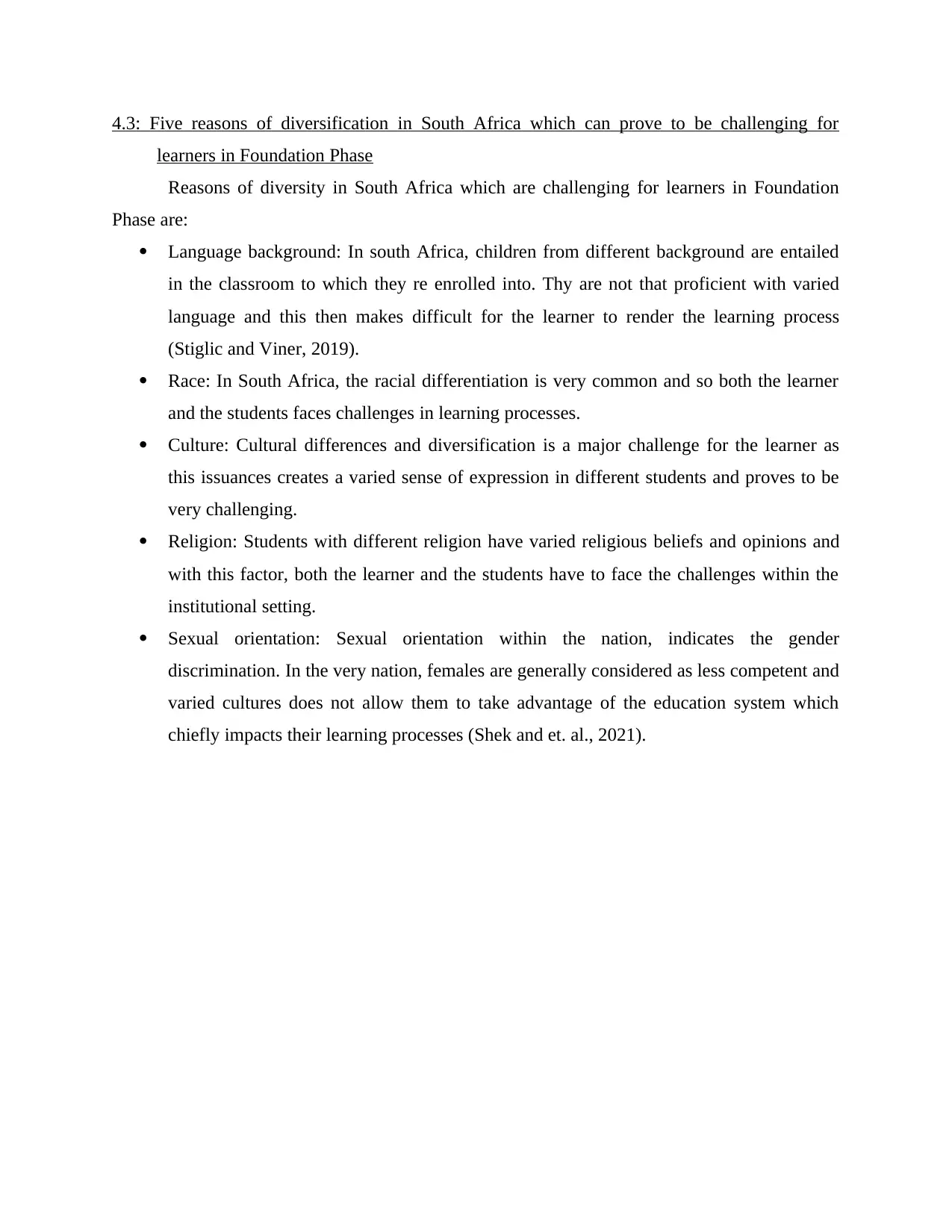
4.3: Five reasons of diversification in South Africa which can prove to be challenging for
learners in Foundation Phase
Reasons of diversity in South Africa which are challenging for learners in Foundation
Phase are:
Language background: In south Africa, children from different background are entailed
in the classroom to which they re enrolled into. Thy are not that proficient with varied
language and this then makes difficult for the learner to render the learning process
(Stiglic and Viner, 2019).
Race: In South Africa, the racial differentiation is very common and so both the learner
and the students faces challenges in learning processes.
Culture: Cultural differences and diversification is a major challenge for the learner as
this issuances creates a varied sense of expression in different students and proves to be
very challenging.
Religion: Students with different religion have varied religious beliefs and opinions and
with this factor, both the learner and the students have to face the challenges within the
institutional setting.
Sexual orientation: Sexual orientation within the nation, indicates the gender
discrimination. In the very nation, females are generally considered as less competent and
varied cultures does not allow them to take advantage of the education system which
chiefly impacts their learning processes (Shek and et. al., 2021).
learners in Foundation Phase
Reasons of diversity in South Africa which are challenging for learners in Foundation
Phase are:
Language background: In south Africa, children from different background are entailed
in the classroom to which they re enrolled into. Thy are not that proficient with varied
language and this then makes difficult for the learner to render the learning process
(Stiglic and Viner, 2019).
Race: In South Africa, the racial differentiation is very common and so both the learner
and the students faces challenges in learning processes.
Culture: Cultural differences and diversification is a major challenge for the learner as
this issuances creates a varied sense of expression in different students and proves to be
very challenging.
Religion: Students with different religion have varied religious beliefs and opinions and
with this factor, both the learner and the students have to face the challenges within the
institutional setting.
Sexual orientation: Sexual orientation within the nation, indicates the gender
discrimination. In the very nation, females are generally considered as less competent and
varied cultures does not allow them to take advantage of the education system which
chiefly impacts their learning processes (Shek and et. al., 2021).
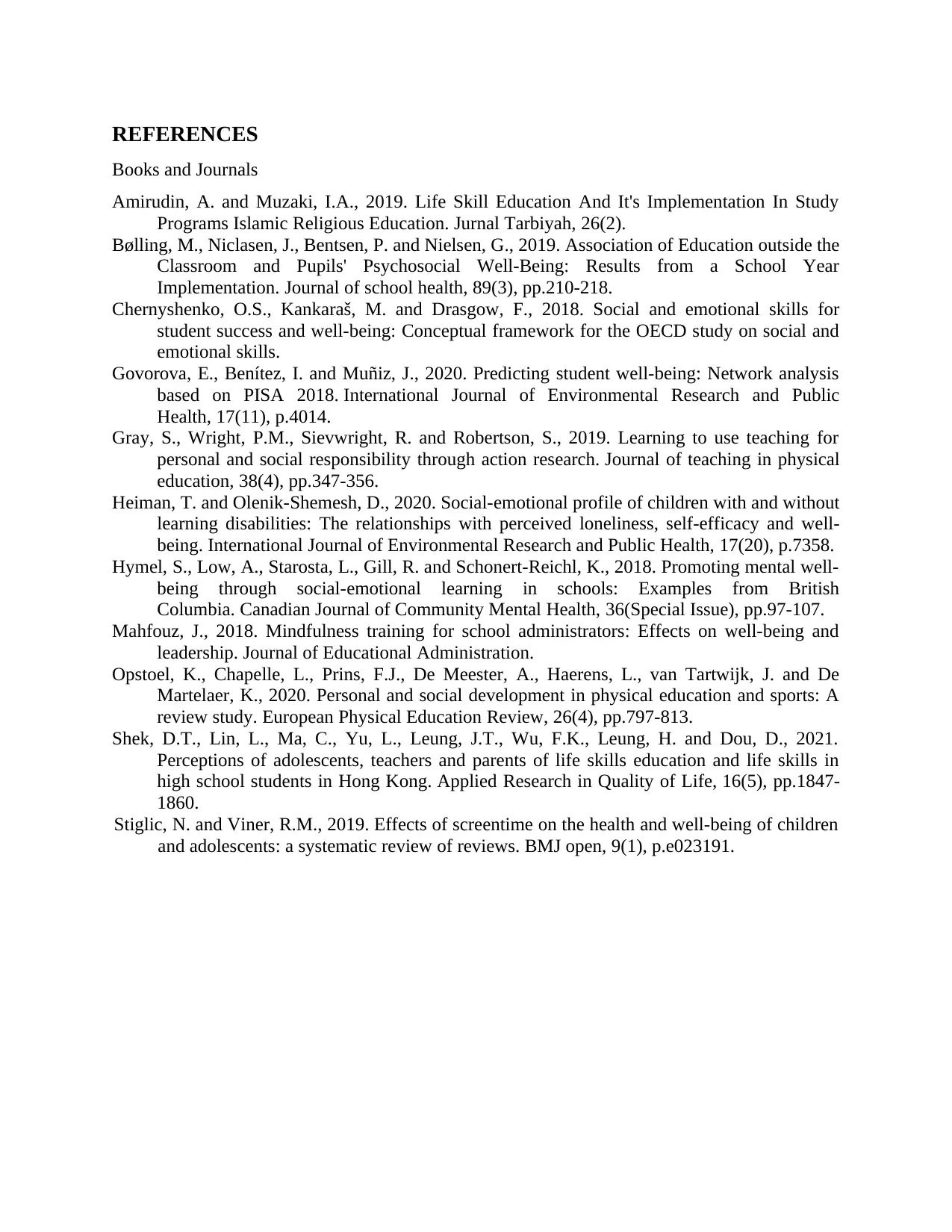
REFERENCES
Books and Journals
Amirudin, A. and Muzaki, I.A., 2019. Life Skill Education And It's Implementation In Study
Programs Islamic Religious Education. Jurnal Tarbiyah, 26(2).
Bølling, M., Niclasen, J., Bentsen, P. and Nielsen, G., 2019. Association of Education outside the
Classroom and Pupils' Psychosocial Well‐Being: Results from a School Year
Implementation. Journal of school health, 89(3), pp.210-218.
Chernyshenko, O.S., Kankaraš, M. and Drasgow, F., 2018. Social and emotional skills for
student success and well-being: Conceptual framework for the OECD study on social and
emotional skills.
Govorova, E., Benítez, I. and Muñiz, J., 2020. Predicting student well-being: Network analysis
based on PISA 2018. International Journal of Environmental Research and Public
Health, 17(11), p.4014.
Gray, S., Wright, P.M., Sievwright, R. and Robertson, S., 2019. Learning to use teaching for
personal and social responsibility through action research. Journal of teaching in physical
education, 38(4), pp.347-356.
Heiman, T. and Olenik-Shemesh, D., 2020. Social-emotional profile of children with and without
learning disabilities: The relationships with perceived loneliness, self-efficacy and well-
being. International Journal of Environmental Research and Public Health, 17(20), p.7358.
Hymel, S., Low, A., Starosta, L., Gill, R. and Schonert-Reichl, K., 2018. Promoting mental well-
being through social-emotional learning in schools: Examples from British
Columbia. Canadian Journal of Community Mental Health, 36(Special Issue), pp.97-107.
Mahfouz, J., 2018. Mindfulness training for school administrators: Effects on well-being and
leadership. Journal of Educational Administration.
Opstoel, K., Chapelle, L., Prins, F.J., De Meester, A., Haerens, L., van Tartwijk, J. and De
Martelaer, K., 2020. Personal and social development in physical education and sports: A
review study. European Physical Education Review, 26(4), pp.797-813.
Shek, D.T., Lin, L., Ma, C., Yu, L., Leung, J.T., Wu, F.K., Leung, H. and Dou, D., 2021.
Perceptions of adolescents, teachers and parents of life skills education and life skills in
high school students in Hong Kong. Applied Research in Quality of Life, 16(5), pp.1847-
1860.
Stiglic, N. and Viner, R.M., 2019. Effects of screentime on the health and well-being of children
and adolescents: a systematic review of reviews. BMJ open, 9(1), p.e023191.
Books and Journals
Amirudin, A. and Muzaki, I.A., 2019. Life Skill Education And It's Implementation In Study
Programs Islamic Religious Education. Jurnal Tarbiyah, 26(2).
Bølling, M., Niclasen, J., Bentsen, P. and Nielsen, G., 2019. Association of Education outside the
Classroom and Pupils' Psychosocial Well‐Being: Results from a School Year
Implementation. Journal of school health, 89(3), pp.210-218.
Chernyshenko, O.S., Kankaraš, M. and Drasgow, F., 2018. Social and emotional skills for
student success and well-being: Conceptual framework for the OECD study on social and
emotional skills.
Govorova, E., Benítez, I. and Muñiz, J., 2020. Predicting student well-being: Network analysis
based on PISA 2018. International Journal of Environmental Research and Public
Health, 17(11), p.4014.
Gray, S., Wright, P.M., Sievwright, R. and Robertson, S., 2019. Learning to use teaching for
personal and social responsibility through action research. Journal of teaching in physical
education, 38(4), pp.347-356.
Heiman, T. and Olenik-Shemesh, D., 2020. Social-emotional profile of children with and without
learning disabilities: The relationships with perceived loneliness, self-efficacy and well-
being. International Journal of Environmental Research and Public Health, 17(20), p.7358.
Hymel, S., Low, A., Starosta, L., Gill, R. and Schonert-Reichl, K., 2018. Promoting mental well-
being through social-emotional learning in schools: Examples from British
Columbia. Canadian Journal of Community Mental Health, 36(Special Issue), pp.97-107.
Mahfouz, J., 2018. Mindfulness training for school administrators: Effects on well-being and
leadership. Journal of Educational Administration.
Opstoel, K., Chapelle, L., Prins, F.J., De Meester, A., Haerens, L., van Tartwijk, J. and De
Martelaer, K., 2020. Personal and social development in physical education and sports: A
review study. European Physical Education Review, 26(4), pp.797-813.
Shek, D.T., Lin, L., Ma, C., Yu, L., Leung, J.T., Wu, F.K., Leung, H. and Dou, D., 2021.
Perceptions of adolescents, teachers and parents of life skills education and life skills in
high school students in Hong Kong. Applied Research in Quality of Life, 16(5), pp.1847-
1860.
Stiglic, N. and Viner, R.M., 2019. Effects of screentime on the health and well-being of children
and adolescents: a systematic review of reviews. BMJ open, 9(1), p.e023191.

1 out of 10
Related Documents
Your All-in-One AI-Powered Toolkit for Academic Success.
+13062052269
info@desklib.com
Available 24*7 on WhatsApp / Email
![[object Object]](/_next/static/media/star-bottom.7253800d.svg)
Unlock your academic potential
© 2024 | Zucol Services PVT LTD | All rights reserved.





